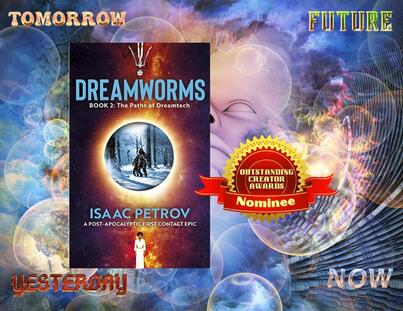|
Score: 90/100 (9.0 out of 10)
When it comes to world-building and mind-bending fiction, it doesn't get much more ambitious and intricate than Dreamworms by Isaac Petrov! This book is an obstacle course akin to something you'd see on American Ninja Warrior. It might leave you breathing hard and possibly make all the muscles in your head suffer from delayed onset muscle soreness. This book is a winding, weaving cobweb or yarn ball of incredible, impressive, amazing, and sometimes puzzling ideas all wrapped into one. Where do we start with this book? Where can we start? This is one of the most complex, labyrinthine stories we've ever seen—dreams inside of dreams inside of dreams with aliens and alternate histories wrapped inside of a post-apocalyptic, dystopian world in which people are executed before their 30s for the greater good and yet still sent to school to learn to do things. WOW. Just... WOW. In other words, the poor people in this world literally go to school for like 90% of their lives. It's hell! They're like mayflies. They exist only to exist and help a future generation to exist before dying. That's incredibly, remarkably tragic and frightening. What if this were real? What if YOU only lived to be 27? What if the government decided the time and the place of your death? What if you couldn't see your kids graduate, get married, and have kids? This book makes a bunch of profound sub-textual or meta-textual statements about the road that humanity is heading. It is clearly inspired by many of the events that have taken place recently, especially the pandemic and global warming. There is also something to be said about population control. The story takes place in times between 2399 AD to 2515 AD. The world has ended. The remaining humans have incredibly short lifespans and run the risk of carrying a deadly virus that could threaten any hope for a future for humanity. Someone seems to have developed a way around this: Dreamtech—a way for human beings to be able to extend the life of their consciousness and memories through dreamlike states or “dream movies.” This allows people to see things that may have happened even centuries before, preserving that memory presumably for eternity. There are some good characters in this book. The fan favorite is inevitably going to be Professor Miyagi, a character whose dialogue is filled with sass and sarcasm. He also has a bit of a potty mouth which raises the recommended age of readers. Another fan favorite may be Edda van Dolah—whose name kept reminding us of former Super Bowl champion receiver Danny Amendola—a legendary historical figure in the world of the book whose real life may have been very different from the “history” that's been taught to the populace. There's also the main protagonist, Ximena, who effectively comes across like your fairly average college student in an extraordinary circumstance. Ximena idolizes Edda and considers her a personal hero and role-model. Miyagi then turns her expectations upside down by revealing that much of Edda's supposed life-story has not been validated and that the accuracy of her merits is debatable. The main issues we had with the book is that it drags a lot and sometimes seems to have no clear plot. The author seems to get sidetracked a lot and want to tell us about things that ultimately don't matter beside adding some fluff and decoration, like characters' perceptions of Napoleon Bonaparte. Yes, we know, this is about how peoples' perceptions of events differ and how history is written by the victors, but we already got that from the rest of the book. This novel probably took us six to eight hours to read, and it felt like ten. Perhaps some things or “wrinkles” in the plot could've been simplified, ironed out, or cut entirely. If you like being moored to shore and feeling your feet touch the ground, this book might not be for you. If you're the kind of person who loves amusement part rides, haunted houses, lava lamps, and/or wants to be shot into outer space for the next Space-X experiment (dang the consequences), then this might be the book for you. This novel is off-the-walls. It reminds us a lot of The Future is a Memory by Charles Ross. Heck, it is almost identical in its subject matter. It shares some similarities with The Matrix and Inception, which is quite a flattering comparison for any work. If you're in for some mind-bending sci-fi, check out this book on Amazon!
0 Comments
Leave a Reply. |
Archives
July 2024
Categories |

 RSS Feed
RSS Feed